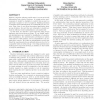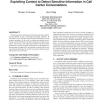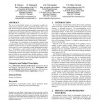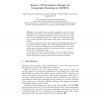45 search results - page 8 / 9 » An Obfuscation-Based Approach for Protecting Location Privac... |
CCS
2009
ACM
14 years 2 months ago
2009
ACM
Modern computer systems permit users to access protected information from remote locations. In certain secure environments, it would be desirable to restrict this access to a part...
WCNC
2010
IEEE
13 years 11 months ago
2010
IEEE
—Privacy is an important requirement in vehicle networks, because vehicles broadcast detailed location information. Also of importance is accountability due to safety critical ap...
CIKM
2008
Springer
13 years 9 months ago
2008
Springer
Protecting sensitive information while preserving the shareability and usability of data is becoming increasingly important. In call-centers a lot of customer related sensitive in...
SAC
2006
ACM
13 years 7 months ago
2006
ACM
The use of recommender systems in e-commerce to guide customer choices presents a privacy protection problem that is twofold. We seek to protect the privacy interests of customers...
ESAS
2006
Springer
13 years 11 months ago
2006
Springer
Inter-vehicle communication is regarded as one of the major applications of mobile ad hoc networks (MANETs). In these so called vehicular ad hoc networks (VANETs) security and priv...




